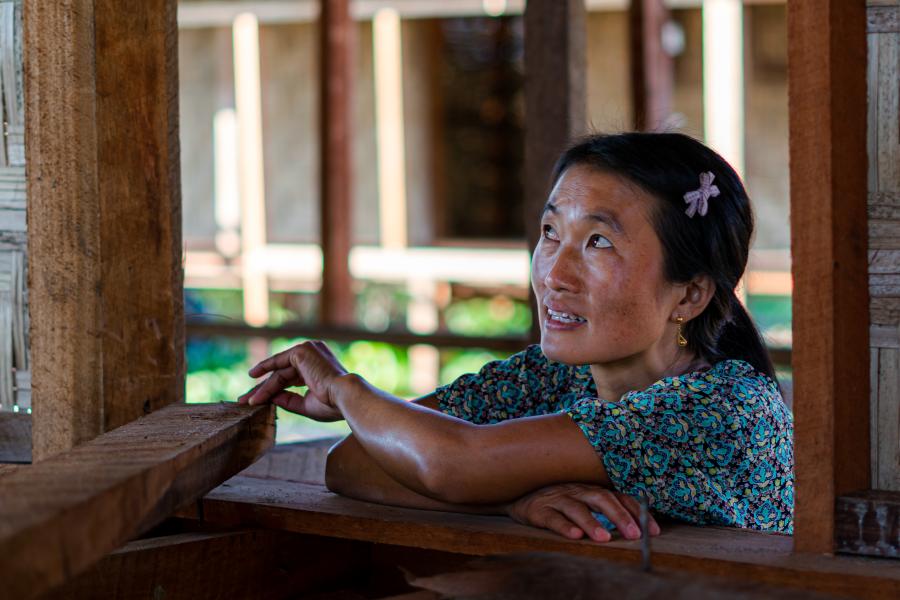2022 Year-end population figures
-
Refugees and asylum seekers, including people in refugee-like situation: 1.3 million, 25% women and 48% children
-
IDPs: 1.5 million, 27% women and 49% children
-
New IDPs in 2022 alone: 1.2 million
-
IDP returns: 325,200
-
Stateless persons in Myanmar (Rohingya): 630,000
2022 situation overview
In 2022, Myanmar grappled with multifaceted crises that resulted in significant further displacement within and from the country. Despite a rapidly evolving and complex environment, UNHCR stayed and delivered. It worked towards solutions within the country, focusing on establishing refugees’ right to return and improving conditions in Rakhine state. With 325,200 IDPs returning to areas of origin (albeit temporarily), transitional solutions activities were pursued in coordination with various regional working groups.
UNHCR maintained its cluster leadership role by coordinating and providing conflict-sensitive assistance in protection, shelter, core relief items, and camp coordination and camp management across the country. UNHCR gained access to parts of the country and expanded its geographic presence to address the escalating emergency in the northwest and southeast while continuing to advocate for humanitarian access and access to territory for those arriving in countries in the region. In tandem, strategic partnerships with local NGOs, civil society, and faith-based organizations were cultivated to strengthen access to people in need of life-saving assistance. In 2022, UNHCR reached 500,000 IDPs and host communities with in-kind support (core relief items), while 100,000 were provided with shelter support and 51,500 benefitted from multi-purpose cash assistance.
3,700 Rohingya, almost half of whom were women and children, embarked on dangerous sea journeys from Bangladesh and Myanmar in 2022 in search of protection, security, family reunification and livelihood opportunities elsewhere – an increase of 360% compared to 2021. In response, UNHCR jointly advocated for shared responsibility and for putting the Bali Declaration into operation and welcomed steps taken by countries such as Indonesia, which allowed the safe disembarkation of over 700 Rohingya refugees in Aceh.
UNHCR engaged with the Association of Southeast Asian Nations and other regional actors in pursuit of solutions for Rohingya and other refugees from Myanmar while advocating for access to territory and protection. UNHCR also supported the development of sub-regional networks of civil registrars, including a Southeast Asian network launching in 2023, as part of the UN’s Economic and Social Commission for Asia and the Pacific regional steering group on civil registration and vital statistics.
In Bangladesh, the transition to the Myanmar curriculum continued with almost 40,000 children benefiting – a promising step expected to not only enhance prospects of sustainable voluntary return to Myanmar once conditions allow but also promote access to education for Rohingya children in Bangladesh. Progress was made in 2022 towards implementing a skills development framework for refugees under the Government of Bangladesh’s leadership to facilitate their eventual return and sustainable reintegration in Myanmar once conditions are conducive. UNHCR delivered essential water, sanitation and hygiene services to 375,400 individuals in Cox’s Bazar.
In a region vulnerable to severe climate shocks, UNHCR provided life-saving emergency shelter support to almost 40,000 households affected by natural hazards and other sudden-onset events in Bangladesh. To reduce environmental degradation and promote a more environmentally sustainable response, UNHCR provided blanket distribution of clean cooking fuel refills (LPG), new cooking stoves and LPG cylinders to all Rohingya refugee households in 16 camps in 2022. UNHCR also piloted the use of fuel-efficient technology among 6,000 households. UNHCR continued to strengthen national health services, in line with priorities outlined in the Global Compact on Refugees, by building specialized hospitals in Ukhiya and Sardar.
Elsewhere, UNHCR scaled up support to the Government-led response in Bhasan Char, where close to 30,000 Rohingya were residing by year-end, to reduce their economic vulnerability and reliance on humanitarian assistance. 24 facilities were constructed and handed over to the authorities and essential water, sanitation and hygiene services were delivered to some 14,000 refugees.
Against an increasingly challenging and competitive funding landscape impacted by the wide-reaching ripple effects of the war in Ukraine – the Myanmar situation was only 58% funded, receiving $204 million against the initial ask of $358.6 million – efforts were made to broaden and diversify partnerships, including through reinvigorated engagement with non-traditional donors from the development and private sectors to promote innovative approaches and galvanize support.
